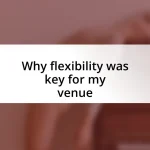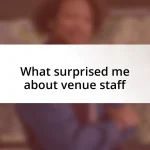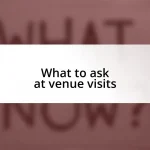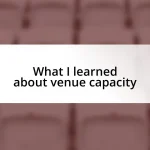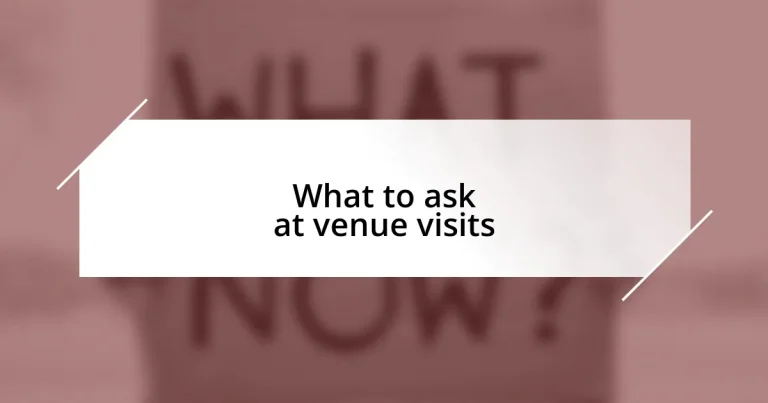Key takeaways:
- Venue visits are essential for understanding the ambiance, layout, and staff energy, which significantly impact event success.
- Preparing a prioritized list of questions related to logistics, costs, and services can maximize the effectiveness of venue tours.
- Inquiring about accessibility features is crucial to ensure an inclusive experience for all attendees.
- Thoroughly reviewing contracts and policies, especially regarding cancellation and liability, protects against unexpected costs and challenges.
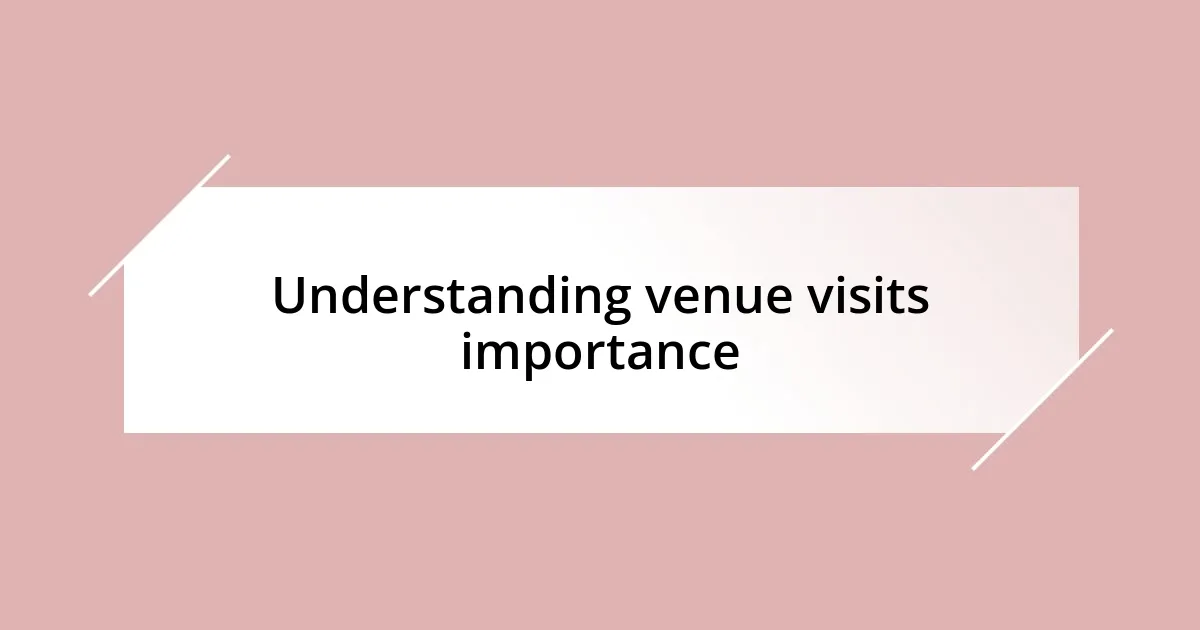
Understanding venue visits importance
When I first started organizing events, I underestimated the significance of venue visits. I thought a website could give me all the information I needed. But, after stepping into a space for the first time, I realized how it changes everything—from the ambiance to the layout, which can profoundly impact the overall experience. Have you ever walked into a venue and just felt it wasn’t right?
Understanding a venue’s vibe is essential to aligning with your event goals. I remember visiting a beautiful hall that seemed perfect online; however, once I got there, the acoustics were so poor I could barely hear myself think. It’s those in-person checks that reveal what pictures or descriptions simply can’t convey.
Moreover, venue visits offer a chance to connect with staff and gauge how they might handle your specific needs. I once met a venue manager who was enthusiastic and full of ideas, and that energy made a lasting impression on me. How might your event change if you feel that energy flowing from the team?
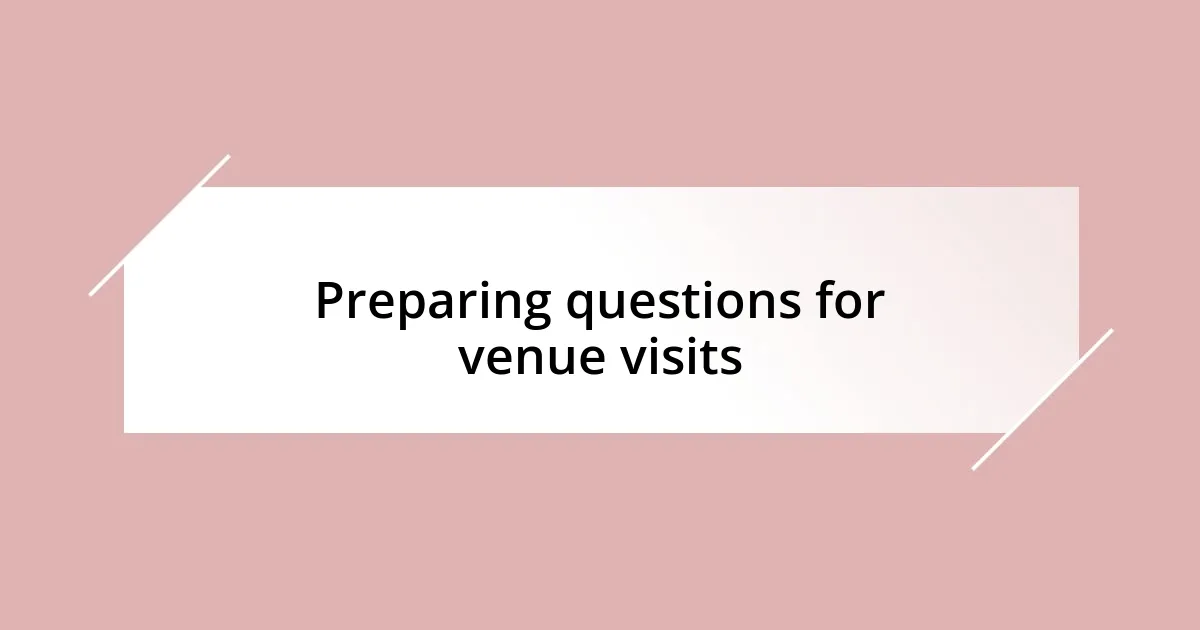
Preparing questions for venue visits
Preparing thoughtful questions for venue visits is crucial for maximizing your time and ensuring you gather all the necessary information. I remember my first venue tour; I had a list of questions ready, but as soon as I entered, I felt overwhelmed and forgot to ask half of them. It’s vital to prioritize your queries—focus on aspects related to capacity, accessibility, and facilities. Have you ever found yourself wishing you’d asked something important during a visit?
As you prepare your questions, consider what’s most significant for your event’s success. For instance, I often ask about available equipment and technical support, as this can make or break your event. During one visit, I discovered a venue offered free audio-visual equipment that was not mentioned online. This saved me both time and money, turning a potentially stressful situation into a seamless experience.
Lastly, it’s helpful to compile questions according to different categories, such as logistics, cost, and services. I find it useful to build rapport with the venue staff by asking about their experiences with past events, which often leads to revealing insights. The energy of the staff can greatly influence your decision, so don’t hesitate to dig deeper into their testimonials and past successes.
| Category | Examples of Questions |
|---|---|
| Logistics | What is the maximum capacity for the venue? |
| Cost | Are there any hidden fees beyond the rental price? |
| Services | What catering options does the venue provide? |
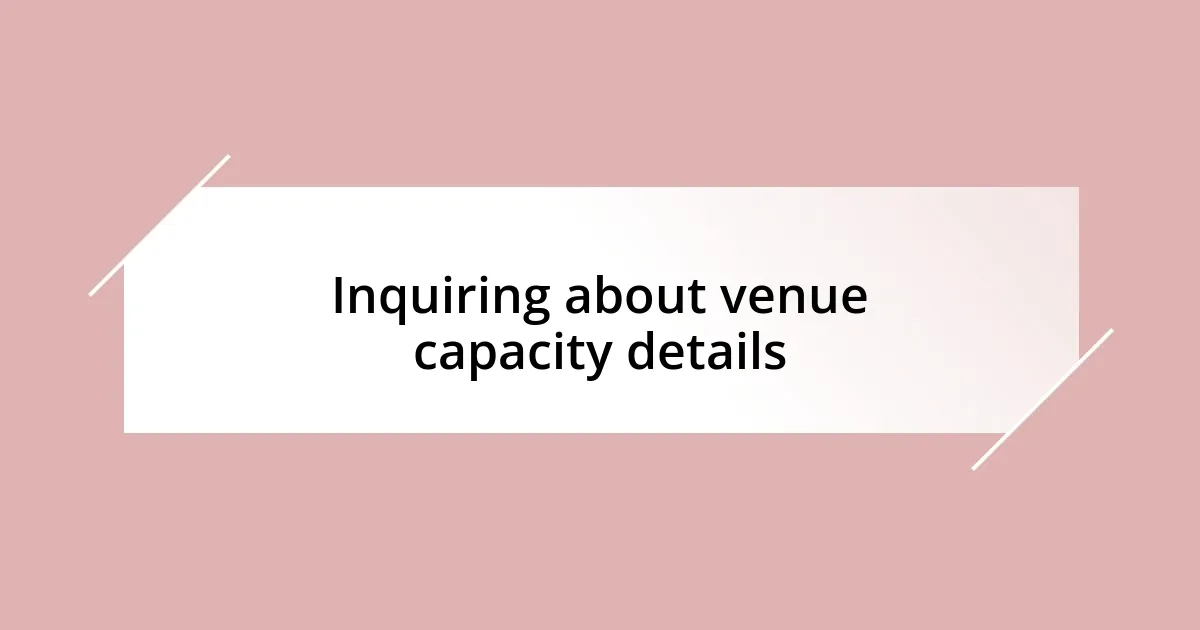
Inquiring about venue capacity details
When inquiring about venue capacity details, it’s essential to dig deep. I recall attending an event where the venue was packed beyond its stated capacity. The feeling of claustrophobia set in, diminishing the experience for everyone involved. Knowing the accurate capacity isn’t just about numbers; it’s about ensuring comfort and safety for your attendees. A thoughtful approach to this can set a positive tone for your whole event.
Here are some key questions to consider when discussing capacity:
- What is the maximum occupancy limit for each room?
- Are there different configurations that affect capacity?
- How does the venue handle safety regulations regarding capacity?
- Can we accommodate additional guests if needed?
- What are the fire codes or laws that might impact capacity?
Asking these questions allows you to fully understand the space and how to best utilize it, making your event planning process smoother and more efficient.
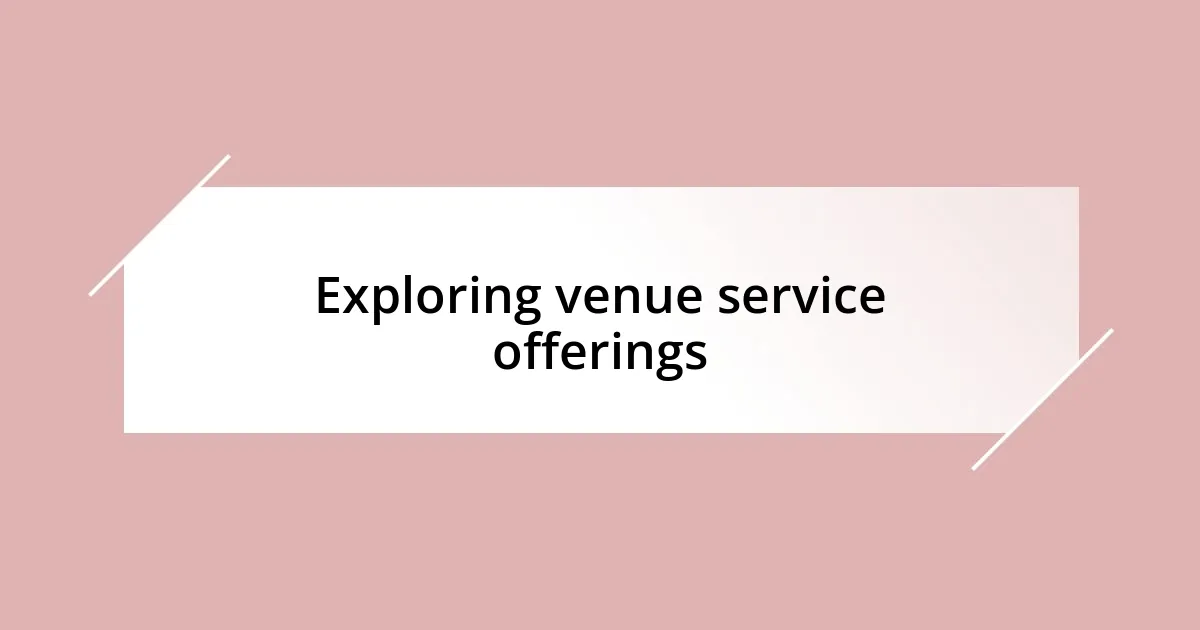
Exploring venue service offerings
Exploring the service offerings of a venue can reveal surprising advantages. For example, during one visit, I learned that a venue provided a dedicated event coordinator. I remember how relieved I felt knowing I wouldn’t be juggling tasks on my own. This service not only saved me time but also allowed me to focus on the experience I wanted to create for my guests. So, have you ever considered how a little extra help could elevate your event?
I find it particularly helpful to ask about the range of services included in the package. On one occasion, I overlooked the importance of in-house catering, thinking I could hire my own. However, the venue’s catering team had an incredible reputation and offered a unique menu that left my guests raving. Asking about these offerings can open doors to creative possibilities you might not have anticipated.
Also, don’t shy away from exploring additional services, like decor options or event setup and teardown assistance. I once underestimated how much effort is involved in setting up an event when I tried to DIY everything. It felt overwhelming, but when I discovered a venue that handled these details, I realized how crucial that was for a stress-free experience. Have you considered how your time and energy could be better spent focusing on what truly matters?
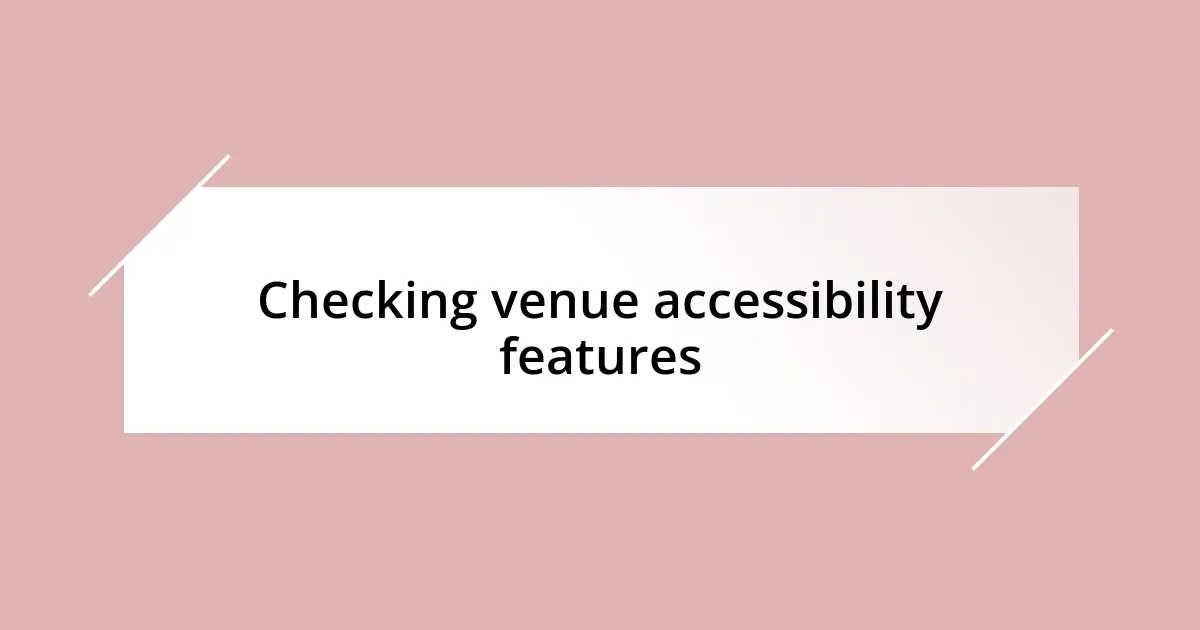
Checking venue accessibility features
Checking Venue Accessibility Features
When evaluating a venue’s accessibility features, I always prioritize inclusivity, as I once attended an event in a stunning venue that lacked essential accommodations for individuals with disabilities. The experience was eye-opening for me – the narrow hallways and absence of ramps made navigation a challenge, impacting everyone’s enjoyment. What is the point of a perfect venue if it doesn’t welcome all guests equally?
To ensure everyone feels comfortable, I suggest asking specific questions. Are there ramps or elevators available? What about restrooms that cater to accessibility needs? If I had inquired more about these aspects during my last venue visit, I might have avoided the discomfort I witnessed for some guests. It’s essential to think about how these features contribute to an event’s overall atmosphere.
When I recall those moments, I can’t stress enough how crucial it is to have a thoughtful approach to accessibility. Sometimes, looking past the aesthetics of a venue can be tough, but it’s important for the event’s success. What would you want your attendees to remember about their experience? I believe making the right choices starts with asking the right questions about how accessible a venue truly is.

Discussing pricing and payment options
When it comes to discussing pricing and payment options, I always make it a point to be upfront about my budget. During one venue visit, I hesitated to share my financial limitations, thinking it might affect our discussion. In reality, when I opened up, the venue manager offered a variety of packages tailored to fit different budgets. Have you ever kept your budget a secret, only to miss out on opportunities?
I also find it invaluable to ask about what’s included in the pricing. I once booked a venue without fully understanding the fine print. Later, I was surprised by additional charges for services I assumed were part of the package. Clarifying details like overtime fees, deposits, and cancellation policies can save you from unexpected stress. Have you ever encountered hidden costs that left you feeling frustrated?
Payment options can be just as important. One thing I learned from my experience is the convenience of flexible payment plans. Some venues offer installments, making it easier to manage expenses. It’s definitely worth inquiring about these options. Have financial concerns ever clouded your event planning? Understanding the payment structure can really ease that burden.
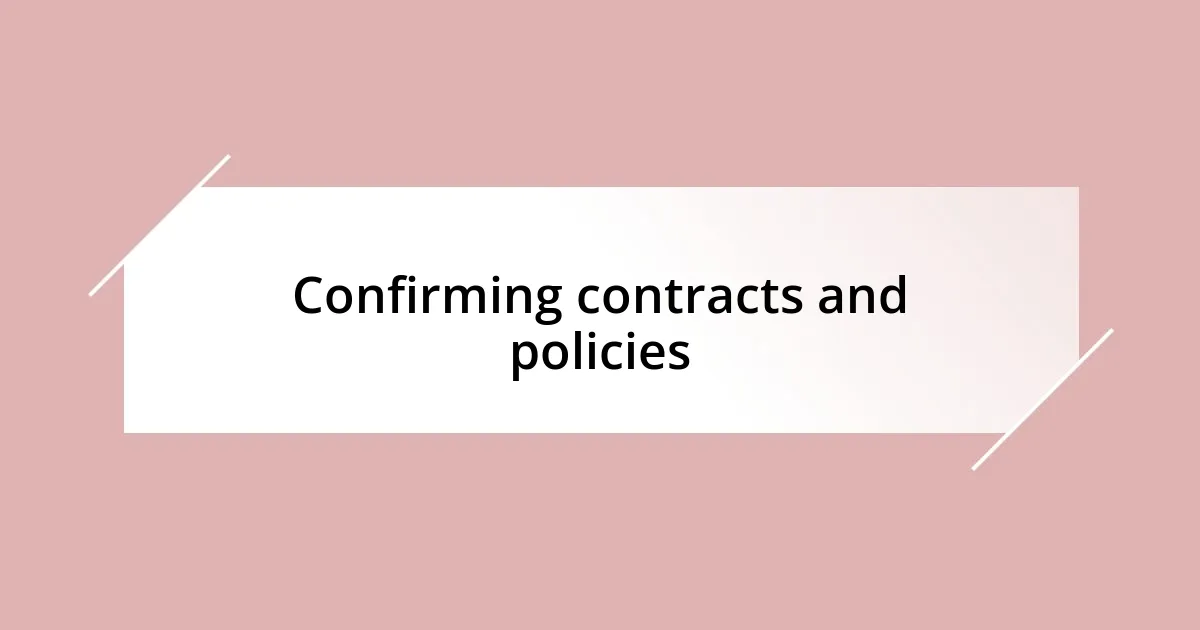
Confirming contracts and policies
When it comes to confirming contracts and policies, I’ve learned the hard way to read every detail carefully. I remember a time when I signed a contract without thoroughly understanding the cancellation policy. When an unexpected situation arose, I found myself facing hefty fees that could have easily been avoided. It’s a sharp reminder—what’s a little extra time spent reviewing against the potential loss?
I recommend asking specifically about the policies around event rescheduling and liability. I once encountered a venue whose liability coverage was ambiguous, which left me feeling uneasy. Imagine investing time and resources into an event only to discover you’re unprotected against unforeseen circumstances. It’s vital to clarify whether they provide insurance options or if you’ll need to arrange your own.
Additionally, understanding the terms of what happens if you need to change the number of guests is crucial. I once had to downsize an event and faced challenges because the venue’s policy imposed strict limits. That experience taught me that policies can significantly influence not just costs, but the overall flexibility of your planning. What if your guest list fluctuates—isn’t it worth ensuring that your venue can accommodate those changes without stress?




